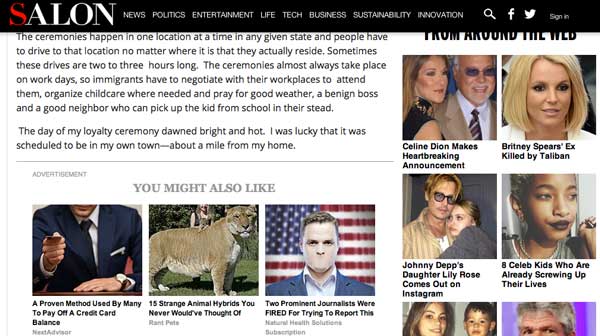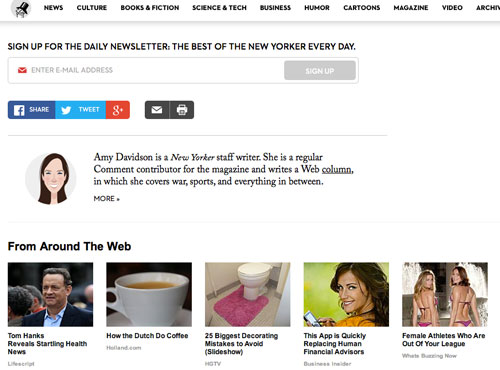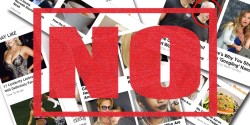In the online media world there is a lot of discussion and controversy about ad blocking right now. A recent Adobe/PageFair study shows a steep rise in people using browser plug-ins so that they aren’t continuously bombarded with increasingly obnoxious display advertisements. Moreover, Apple’s newest iOS update allows ad blocking on iPhones and iPads for the first time. Writer Casey Johnston recently published a widely-circulated piece attempting to see where the battle between ads and ad blockers may be leading internet media. She worries that ad blocking will really hurt small independent publishers the most.
I have to admit that I started selectively using an ad blocker myself. However, I do feel a little guilty about it. I really do empathize with sites that publish quality reporting and journalism which rely on ad dollars to help fund their work. But as the ad bombardment reaches new heights–with pop-overs and auto-play videos that often bring my browser to its knees, along with just awful ad content–I start wondering if readers are getting a fair deal.
A Strained Bargain
I get that there’s an implicit bargain of sorts between online publishers that offer free access and the readers who consume it: the publisher doesn’t charge you for content in exchange for you seeing the ad. While I may not be crazy about a lot of the ads I see, until recently I’ve thought it was a mostly reasonable arrangement. As I noticed some sites hosting more terrible ads for scammy diets and predatory loans, I chose to avoid them in protest rather than circumvent the bargain. Weather.com and the Huffington Post are two such sites that comes to mind, while ones like Wired or The Washington Post seemed to mostly avoid the bottom feeders.
But then in the last year or so things got worse. I can summarize what pushed me to finally install an ad blocker in two words: Outbrain and Taboola. These are two services that provide the “You might be interested in…” links found all around the web. I was disappointed to see an increasing amount of lowest-common-denominator click-bait teases for garbage like “8 Celeb Kids Who Are Likely Screwing Up Their Lives” and “10 Actors That Came Out Of The Closet… #3 Will Upset Women Everwhere” on sites that I thought were above it.

Actual ads from Salon.com
It’s like opening up an issue of The New Yorker only to find a full-page ads for colloidal silver supplements and “natural male enhancement” pills. (Actually, on The New Yorker’s website I’m only subjected to the more neutered “Tom Hanks Reveals Startling Health News” and “Female Athletes Who Are Out of Your League.”)

Yes, these ads are on the New Yorker’s website.
I start to think these click-bait ads pose a violation of my trust, which threatens that fragile agreement between publisher and reader. Sure, I can ignore them, but as they start crowding out the actual content I’m there to read, the publisher is asking for more attention and effort from me than has been traded for.
We Honor Your Time and Attention
At Radio Survivor we will not do this to you. Simply put, we want to honor and respect the time you spend reading our site and listening to our podcast.
Not long ago we, too, relied on display ads to help pay our basic costs. While we rarely heard about truly offensive ads, we had minimal control over the ads our readers saw. So we found it to be an uncomfortable compromise, especially for the limited revenue we derived. That’s why we were thrilled when our Patreon supporters pledged to contribute enough to replace that income, allowing us to ditch those ads. We gave readers a choice, and many of you chose to help us relinquish our dependence on ads.
The thing is, I’m not opposed to display ads in principle. In their most benign form they’re just the 21st century version of newspaper and magazine ads. Publications from The New Yorker to The Nation, and even punk ’zines, perennially have relied on ads. Sure, there are even some dodgy ones (need any “human pheromones”?) in the back classified-style pages of The Nation, The Atlantic or The New York Review of Books, but almost never are they sandwiched into the meat of a cover feature, making them quite easy to avoid. By comparison, web display ads have become idisciriminately pooped all over the place, too often with absolutely no regard for the tone or subject of the content they infiltrate.
Look, I understand that this is happening because the amount of money publishers make from ads keeps decreasing; they need an increasing number of views on more ads to just to keep things stable. I also imagine there are web editors who aren’t happy about having to yield to that pressure. We experienced it first hand, so I truly do empathize. (I also empathize with legitimate advertisers who are having their hands forced by all the clutter and noise.)
Direct Reader Support: A Better Way?
At the same time, I don’t have a solution to the display ad problem. That’s why we at Radio Survivor are taking another route, by asking our readers and listeners directly to fund what we do. Rather than having a rotating cast of third-parties chip in fractions of a cent every time you see their ads on our site, we hope you’ll chip in yourself for the ability to benefit from our efforts.
Our goal is to become sustainable–where every contributor is compensated fairly for her work on Radio Survivor–and then grow our coverage, going deeper into stories and doing investigative reporting of the type that we simply don’t have the resources for yet.
We use Patreon to make it simple for you to contribute a consistent amount every month, similar to how public and community stations now ask listener members to give $5, $10 or $20 a month instead of a lump sum once or twice a year. The great thing about this method is that even small contributions, like $1 a month, really add up, while being nearly painless for each contributor. Also, no commitment is required – you can start and stop contributions at any time.
However, we understand that not everyone can make a monthly contribution. That’s why we also accept one-time contributions via PayPal.
If you’ve enjoyed, learned from or found value in our weekly coverage of topics like low-power FM, community radio, college radio, as well as the fun side of radio, then I hope you’ll consider helping us do this, while remaining as independent as possible.
You’ll also help us keep this little corner of the internet free of click-bait and other scammy stuff. We prefer to respect your intelligence and the precious few moments of your time that you spend with us.
Thank you!



